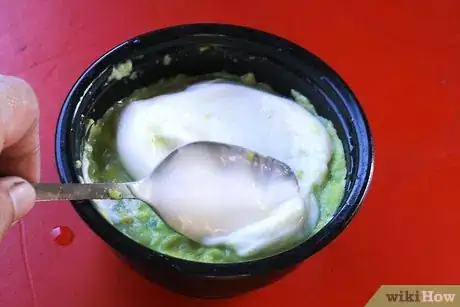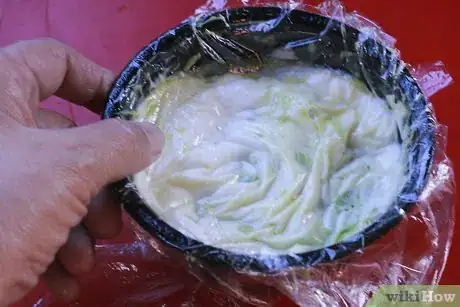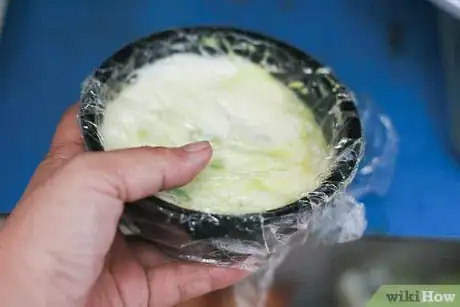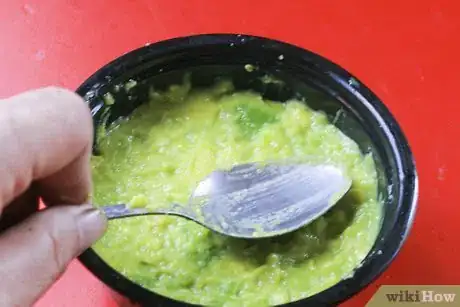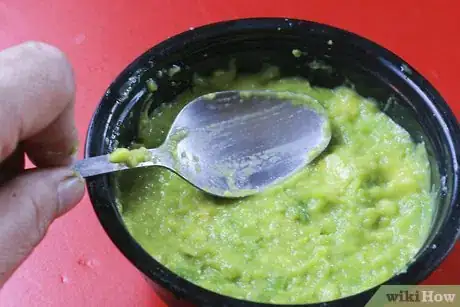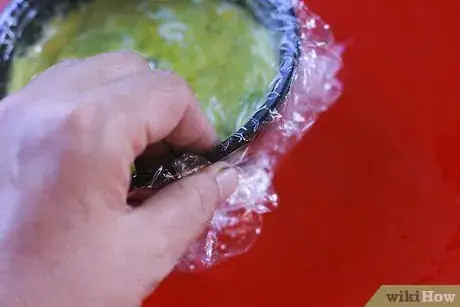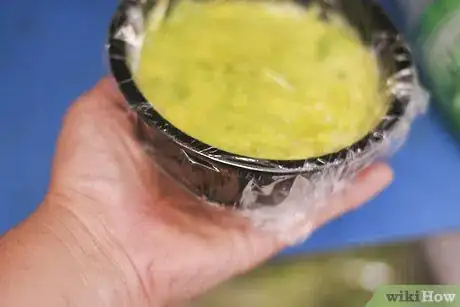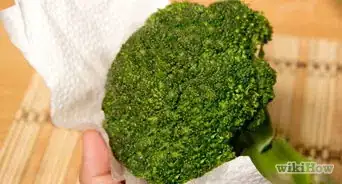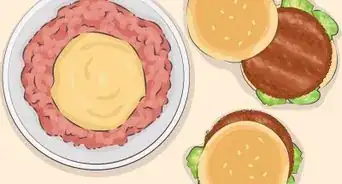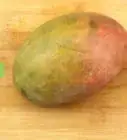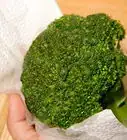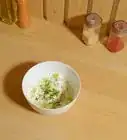This article was co-authored by wikiHow Staff. Our trained team of editors and researchers validate articles for accuracy and comprehensiveness. wikiHow's Content Management Team carefully monitors the work from our editorial staff to ensure that each article is backed by trusted research and meets our high quality standards.
This article has been viewed 112,909 times.
Learn more...
If you've ever made your own guacamole, you know how frustrating it is to see your leftovers turn brown and then black overnight in the fridge. The key to keeping this tasty dip green is to limit the amount of air it touches. When guacamole comes in contact with oxygen, it starts to turn brown. You can keep it green by "sealing" it with sour cream, water, or plastic wrap.
Steps
Using Sour Cream
-
1Transfer the guacamole to the smallest bowl it will fit in. Try to leave no more than ½ inch (1.27 centimeters) of space between the guacamole and the bowl's rim.
-
2Smooth out the surface of the guacamole with a spoon, making it as flat as possible. This will make it easier to spread the sour cream on top—and scrape the sour cream off later.Advertisement
-
3Spread a thin layer of sour cream over the surface of the guacamole. Keep adding the sour cream until you can't see the guacamole anymore. The sour cream will create a "seal" between the guacamole the air and keep it from turning brown.
-
4Wrap a sheet of plastic wrap over the sour cream. Smooth it out until it is pressed flat against the sour cream. Wrap the excess plastic wrap against the sides of the bowl to improve the seal. This will help keep the sour cream itself fresh.
-
5Store the guacamole in the fridge until you are ready to eat it. It will taste better if you eat it later that day, but the guacamole can stay fresh for up to three days.
- When you are ready to eat the guacamole, scrape the soul cream off, or stir it in for a creamier dip.
Using Water
-
1Transfer the guacamole into a container with a tight-fitting lid. Make sure that there is about 1 inch (2.54 centimeters) of space between the guacamole and the rim of the container.
- Try to pack the guacamole as tightly as you can so that there are no air bubbles.
-
2Smooth the surface of the guacamole. You can use the bowl of a spoon or a spatula. Make sure that there are no bumps, ridges, or ripples.
-
3
-
4Cover the container with the lid, and put it into the fridge. The guacamole will be good for up to three days.
-
5Pour the water out when you are ready to use the guacamole. If you need to, give the guacamole a quick stir. This will help blend in any excess moisture into the rest of the guacamole.[3]
Using Plastic Wrap
-
1Transfer the guacamole to the smallest bowl it will fit in. Try to leave no more than ½ inch (1.27 centimeters) of space between the guacamole and the bowl's rim.
-
2Smooth out the surface of the guacamole with a spoon, making it as flat as possible. This will make it easier to spread the sour cream on top—and scrape the sour cream off later.
-
3Consider sprinkling some lime juice, lemon juice, or olive oil over the surface of the guacamole. This will help give you an additional barrier between the air (which turns guacamole brown) and the guacamole. It will also give your guacamole extra flavor.[4]
-
4Smooth a sheet of plastic wrap over the guacamole. Place a sheet of plastic wrap over the bowl. Using your fingers, smooth the plastic down until it is pressing against the entire surface of the guacamole. The plastic wrap will create a sort of seal between the air and the guacamole.[5]
-
5Wrap the excess plastic wrap over the edges of the bowl. If you want, you can place a tight-fitting lid over the bowl. You can also wrap a rubber band around the sides of the bowl to secure the plastic wrap.
-
6Store the guacamole in the fridge until you are ready to eat it. It will taste the best if you eat it the same day, but guacamole can last for up to three or four days in the fridge.
Community Q&A
-
QuestionIs it unsafe to eat guacamole after it turns dark?
 Community AnswerThe darkening of the guacamole you see is the avocado oxidizing because it has been exposed to oxygen, it is totally safe to eat it as long as it hasn't been sitting out for more than 6 hours and it hasn't been more than a week since you made or bought it.
Community AnswerThe darkening of the guacamole you see is the avocado oxidizing because it has been exposed to oxygen, it is totally safe to eat it as long as it hasn't been sitting out for more than 6 hours and it hasn't been more than a week since you made or bought it. -
QuestionHow far ahead can you make it?
 Community AnswerStore-bought guacamole that’s unopened should last 1-2 weeks. Once opened, store-bought guacamole usually lasts 1-2 days. Homemade guacamole also usually lasts 1-2 days. You’ll know it’s gone bad when it has a substantial puddle of brown liquid and the layers below the surface have lost their vibrant green hue.
Community AnswerStore-bought guacamole that’s unopened should last 1-2 weeks. Once opened, store-bought guacamole usually lasts 1-2 days. Homemade guacamole also usually lasts 1-2 days. You’ll know it’s gone bad when it has a substantial puddle of brown liquid and the layers below the surface have lost their vibrant green hue.
Things You'll Need
Using Sour Cream
- Small bowl
- Plastic wrap
- Sour cream
Using Water
- Small bowl
- Lid
- Water
Using Plastic Wrap
- Small bowl
- Plastic wrap
- Lid or rubber band (optional)
References
- ↑ https://www.thekitchn.com/best-way-to-keep-guacamole-green-193462
- ↑ http://www.seriouseats.com/2012/01/the-food-lab-the-best-guacamole-avocados-science-browning-ripening.html
- ↑ https://www.thekitchn.com/best-way-to-keep-guacamole-green-193462
- ↑ http://www.epicurious.com/archive/blogs/editor/2014/04/how-to-keep-guacamole-green.html
- ↑ http://www.theguardian.com/lifeandstyle/wordofmouth/2010/aug/12/how-to-make-perfect-guacamole
- ↑ http://www.theguardian.com/lifeandstyle/wordofmouth/2010/aug/12/how-to-make-perfect-guacamole
- ↑ http://www.goodhousekeeping.com/holidays/a22711/have-guac-will-travel/
About This Article
To keep guacamole fresh, start by transferring it to a small bowl. The less extra space, the better. Then, pour some lime juice or olive oil over the top of the guacamole to protect it from the air so it doesn't turn brown. After that, just cover the top of the bowl with plastic wrap and put the guacamole in the fridge until you're ready to eat it! If you want to learn how to use sour cream or water to preserve your guacamole, keep reading the article!


